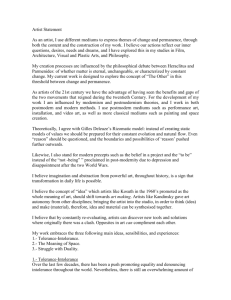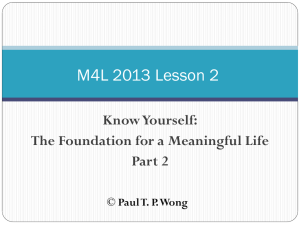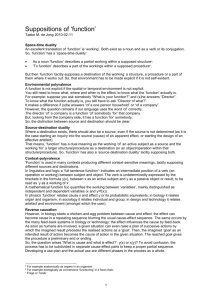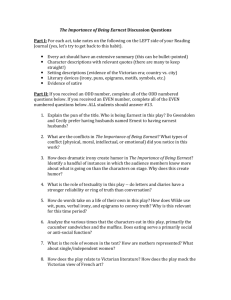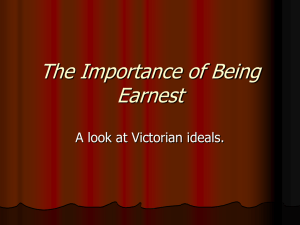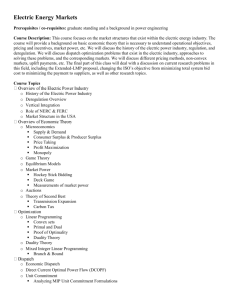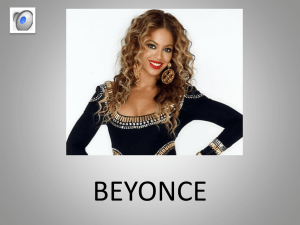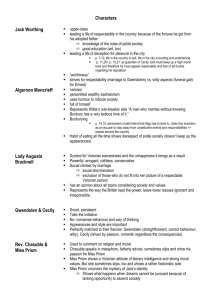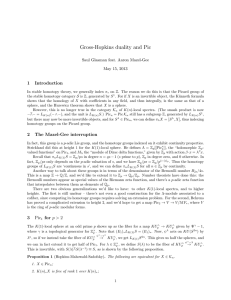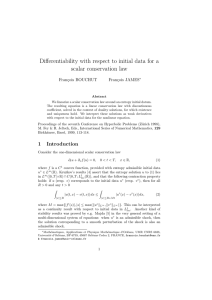Instituto de Formación Docente Continua Lenguas Vivas Bariloche
advertisement
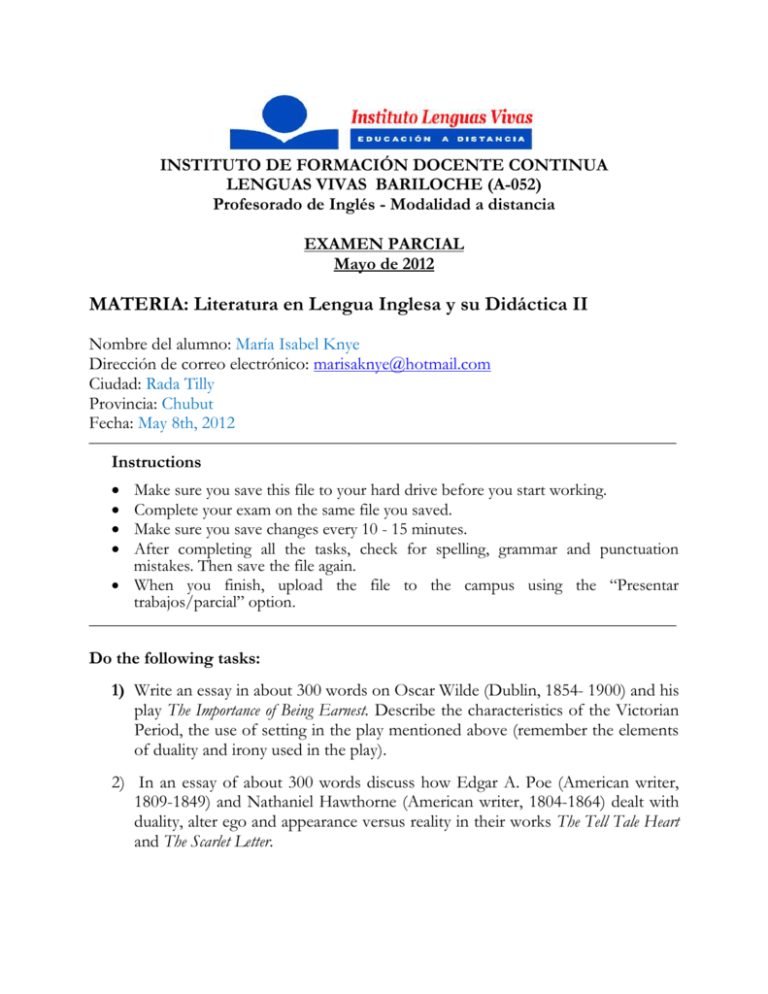
INSTITUTO DE FORMACIÓN DOCENTE CONTINUA LENGUAS VIVAS BARILOCHE (A-052) Profesorado de Inglés - Modalidad a distancia EXAMEN PARCIAL Mayo de 2012 MATERIA: Literatura en Lengua Inglesa y su Didáctica II Nombre del alumno: María Isabel Knye Dirección de correo electrónico: marisaknye@hotmail.com Ciudad: Rada Tilly Provincia: Chubut Fecha: May 8th, 2012 ______________________________________________________________________________ Instructions Make sure you save this file to your hard drive before you start working. Complete your exam on the same file you saved. Make sure you save changes every 10 - 15 minutes. After completing all the tasks, check for spelling, grammar and punctuation mistakes. Then save the file again. When you finish, upload the file to the campus using the “Presentar trabajos/parcial” option. ______________________________________________________________________________ Do the following tasks: 1) Write an essay in about 300 words on Oscar Wilde (Dublin, 1854- 1900) and his play The Importance of Being Earnest. Describe the characteristics of the Victorian Period, the use of setting in the play mentioned above (remember the elements of duality and irony used in the play). 2) In an essay of about 300 words discuss how Edgar A. Poe (American writer, 1809-1849) and Nathaniel Hawthorne (American writer, 1804-1864) dealt with duality, alter ego and appearance versus reality in their works The Tell Tale Heart and The Scarlet Letter. Task 1 Oscar Wilde wrote “The Importance of Being Earnest” in 1895. The Play can be seen as a self-parody or an autobiography since we may see Wilde himself represented by Algie, the dandy who pays too much attention to his outfit and a witty character. The play, which is set in the last times of the Victorian period, mocks the boredom, pomposity, solemnity, sense of duty, and self-righteousness that were the characteristics of the era and the restrictions they imposed on society. This piece of work is a satire, a comedy of manners and also an intellectual farce. Every character satirizes the hypocrisy of that society’s moral, showing all of them as trivial and shallow. Both, the main character, Jack Worthing, and the second hero in the play, Algy Moncrieff, have an alter-ego, that is to say a second self that allows them to get out of their social obligations and lets them do the things they would never do in their real lives so as to keep their image of respectability intact. Jack’s alter-ego is his supposed younger brother Ernest, whose name he used when in London; the black sheep of the family who is always in trouble and needs Jack to solve his problems. Algy’s alter-ego is Mr. Bunbury, a sick, invalid man who calls his dear friend Algernon to be by his bedside every time he is in need of assistance. This “Bunbury” alter-ego has been interpreted by some critics as a word that implies homosexuality which was not at all accepted by the Victorian moral standards. The female characters, Gwendolen and Cecily, have a fixation with the name Ernest and here we get to the irony of the title of the play since “earnest” means serious and sincere which none of the male characters are. While Gwendolen is the perfect image of a young girl from the city, Cecily is the image of an innocent girl brought up in the country, but they both agree that the name Ernest inspires confidence. When it comes to Lady Brackwell and her list of possible matches for her daughter Gwendolen, we can clearly see the preoccupations of Victorian respectability when she asks about Worthing’s family background, social position and incomes. The sole idea of Mr. Worthing not knowing who his parents were, made him unsuitable for her daughter. In conclusion, Wilde makes fun of all these moral restrictions throughout his play using irony and sarcasm. Task 2 Alter-ego, duality, appearance versus reality, aren’t they the same or just similar ways of dealing with guilt? In Hawthorne’s work “The Scarlet Letter”, I found alter-ego in Chillingworth since this is the only character who poses himself as someone else so as not to deal with the shame of being the husband who has been deceived, of course, it is related to appearances versus reality as it seems, throughout the narration, to be more important for him to be seen as a respectable man of knowledge. This duality in Chillingworth turns him into a different man who only seeks revenge and this is denied to him at the end because of Dimmesdale’s death and his admission of guilt. In Dimmesdale, I recognize duality and appearance versus reality. This duality is shown by Hawthorne with his thorough description of how the priest’s health deteriorates as time goes by and the inner struggle of the character between his need to come forward with the truth and remain the holly person the town dwellers believe him to be. As regards Poe and his short story “The Tell Tale Heart”, duality is revealed through the opposed feelings of the main character who on the one hand loves his employer but on the other one he can’t stand the sight of his strange eye. Within his madness, he cannot discern between reality and appearance. The duality, as I see it, can also be represented by the way in which he carefully plans every step of his crime and carries it out and how, finally, he uncovers what he has done to the police since his guilt, represented by reality, seems to be more powerful than appearance.
